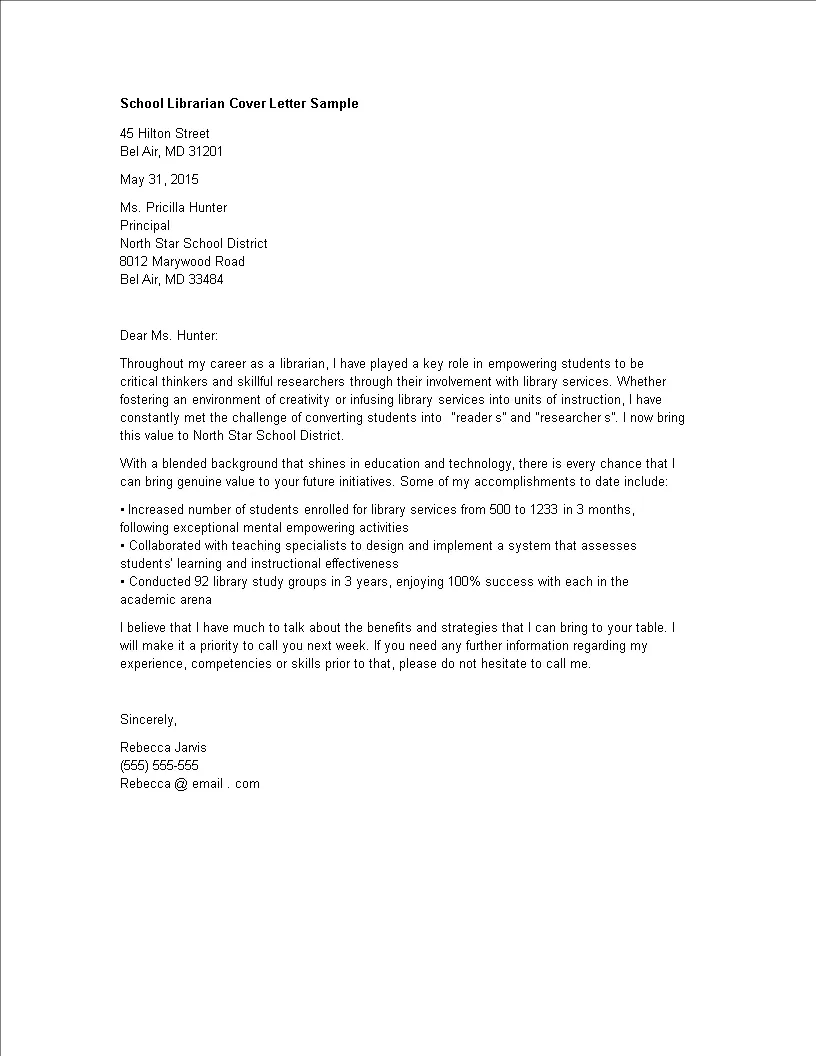Crafting Your Library Job Cover Letter
A well-written cover letter is your first opportunity to impress a potential employer and secure a library job interview. It’s more than just a formality; it’s a crucial document that showcases your skills, experience, and enthusiasm for the role. Your cover letter provides a platform to elaborate on your resume, highlighting the aspects that align with the specific job requirements. It’s your chance to tell a story, illustrating why you’re the perfect candidate. This how-to guide will walk you through the key elements of writing a compelling cover letter for library positions, ensuring you make a memorable impression. The goal is to demonstrate your understanding of the library’s mission, your skills, and your passion for the world of libraries.
Research the Library and Job Requirements
Before you start writing, thoroughly research the library and the specific job you’re applying for. Visit the library’s website, read their mission statement, and understand their services and community focus. This research will enable you to tailor your cover letter to the library’s unique needs and values. Carefully analyze the job description, identifying the key skills, experience, and qualifications the library is seeking. Make a list of these requirements and map them to your own skills and experiences. This targeted approach ensures your cover letter directly addresses the employer’s needs, increasing your chances of getting noticed. Understanding the library’s environment and the role’s expectations will provide a solid foundation for your cover letter, showcasing your genuine interest and preparedness.
Highlight Relevant Skills and Experience
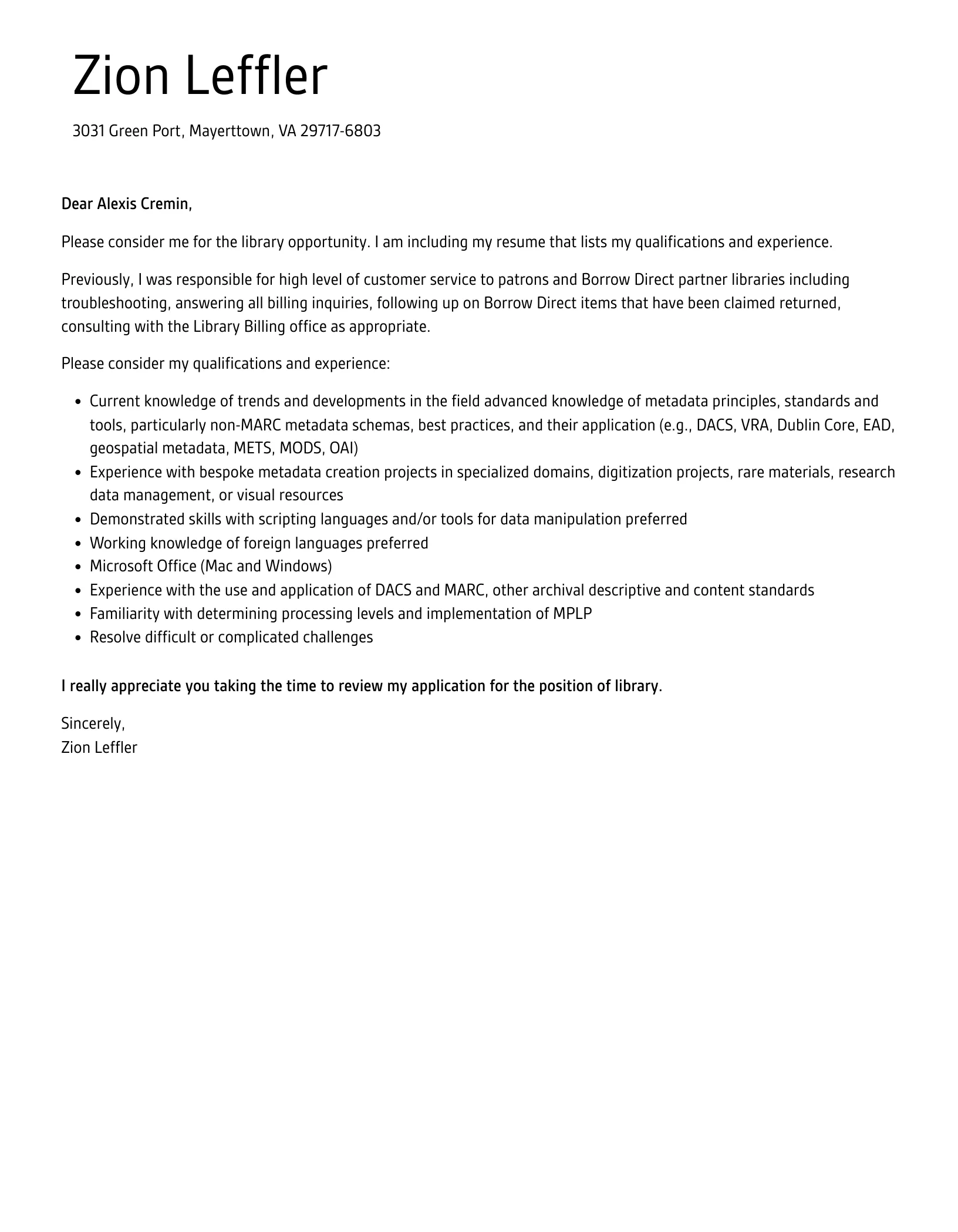
Your cover letter should highlight the skills and experience that align with the job description. Instead of simply restating your resume, provide specific examples of how you’ve demonstrated these skills in previous roles. Use the STAR method (Situation, Task, Action, Result) to illustrate your accomplishments. For example, instead of saying “Managed library programs,” describe a specific program, the challenges you faced, the actions you took, and the positive results you achieved, like increased program attendance or improved community engagement. Tailor your examples to the specific job requirements, emphasizing the skills that the library values most. This targeted approach demonstrates your ability to deliver results and your understanding of the role’s responsibilities. By linking your experiences to the library’s needs, you create a compelling narrative that showcases your suitability for the position.
Skills to Showcase on Your Cover Letter
When writing your cover letter, focus on the skills most relevant to the library job. These may include excellent communication and interpersonal abilities for interacting with patrons, colleagues, and community members. Highlight your proficiency in information management, including cataloging, database searching, and digital literacy. Demonstrate your problem-solving and organizational skills by providing examples of how you’ve resolved issues or managed projects successfully. Show your familiarity with library systems, software, and technologies. Customer service skills are essential, so emphasize your ability to provide helpful and friendly service. Also, include leadership and teamwork capabilities to show your ability to work collaboratively and potentially supervise others. Tailor these skills to the specific job requirements to show you’re the best fit. Remember to use action verbs to make your examples more dynamic and engaging.
Experience to Include on Your Cover Letter
Your experience is what sets you apart, so use your cover letter to showcase relevant experiences. For entry-level positions, emphasize volunteer work, internships, or relevant coursework. For more experienced candidates, highlight previous library roles, projects you’ve managed, and any leadership experience. Be specific about your roles and responsibilities in past jobs. Quantify your achievements whenever possible, such as the number of patrons served, programs implemented, or improvements to library processes. If you’ve worked with specific library systems or technologies, be sure to mention them. If you have any experience with community outreach or grant writing, these skills can also significantly boost your application. Providing clear, concise examples of your experience will demonstrate your competence and potential to succeed in the role.
Quantify Your Achievements
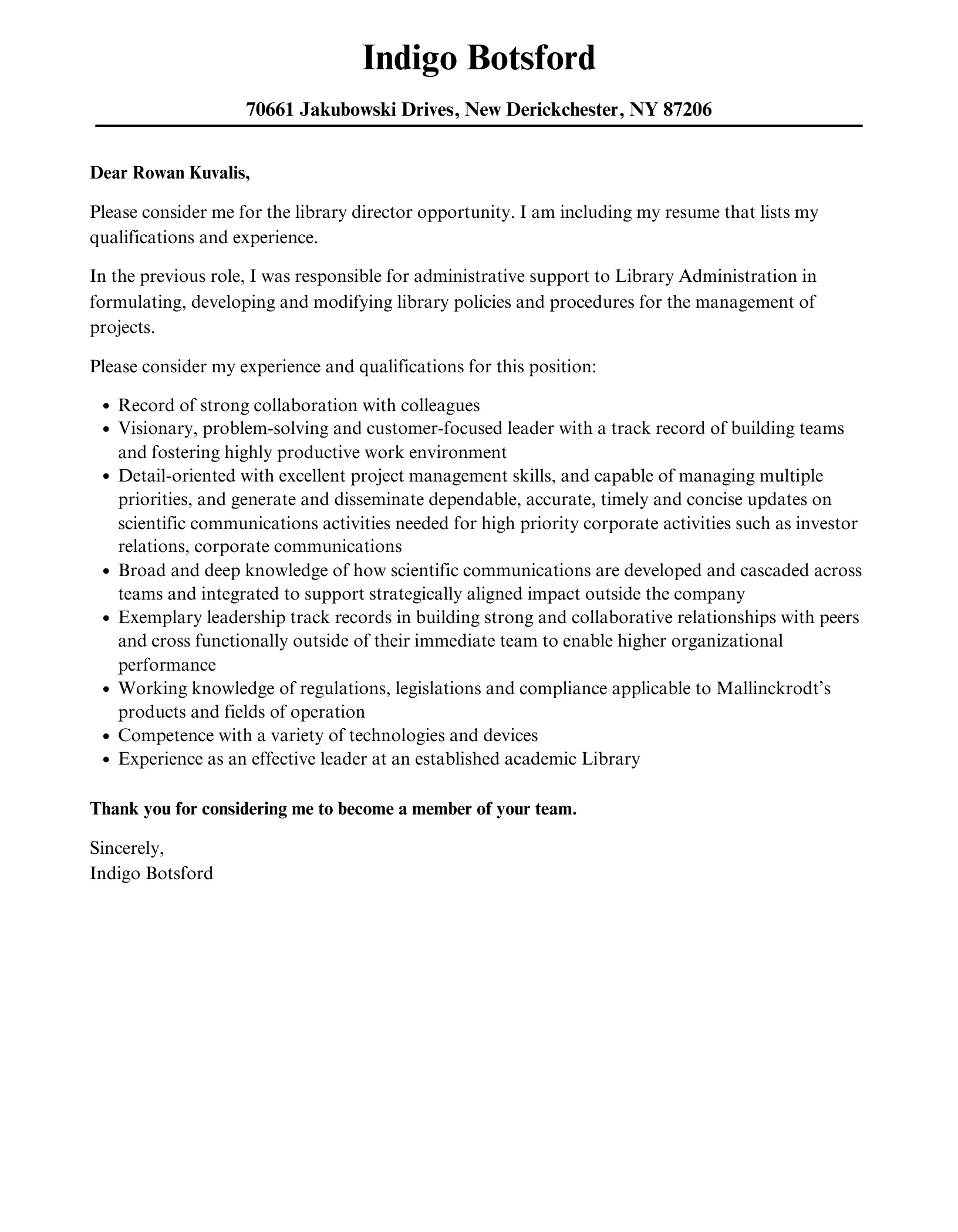
Using numbers and data to support your claims makes your cover letter more impactful. Instead of saying “Improved program attendance,” specify the percentage increase or the number of new attendees. Instead of saying “Managed social media,” mention the increase in followers or engagement rates. Quantifying your accomplishments provides concrete evidence of your skills and abilities, showing the employer the value you can bring to the library. For example, if you’ve organized a successful event, provide details on the number of participants, the positive feedback received, or any revenue generated. Be specific about your responsibilities and how your actions led to positive outcomes. Using numbers helps potential employers quickly understand your impact and assess your potential contributions.
Demonstrate Your Passion for Libraries
Show your passion for libraries and what motivates you to pursue this career. Share why libraries are important to you and why you want to contribute to their mission. It might be your love of reading, a desire to connect people with information, or a commitment to community service. Illustrate this passion by mentioning any library-related activities you’ve participated in, such as volunteering, attending library events, or being an active library user. This shows that you genuinely care about the role and the organization. Explain how you can contribute to the library’s vision and what you bring to the table. Expressing genuine enthusiasm will make your cover letter stand out. Show your enthusiasm for libraries and what motivates you to pursue this career.
Writing a Compelling Cover Letter Opening
Your opening paragraph is your first opportunity to grab the reader’s attention. Start with a strong, engaging statement that immediately highlights your interest in the position and the library. Avoid generic openings and instead, personalize your letter by referencing the specific job or the library’s mission. You could mention something you admire about the library, a specific program, or a community initiative. State the position you’re applying for and briefly summarize why you’re a good fit. Make your opening concise and focused, clearly communicating your enthusiasm and the value you bring to the table. A well-crafted opening sets the tone for the rest of your cover letter, encouraging the reader to continue reading and learn more about you.
Focusing on the Specific Job Description
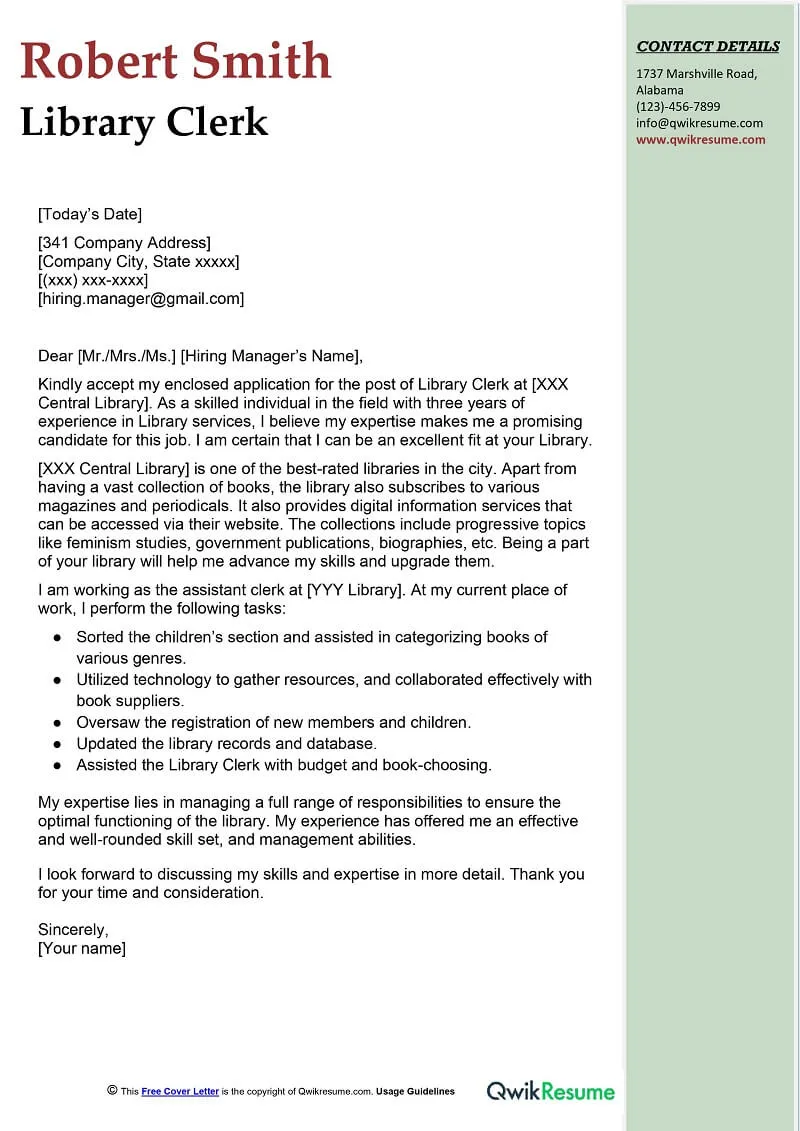
Tailor your cover letter to the specific job description, addressing each requirement in detail. Read the job posting carefully and identify the key skills, experience, and qualifications the employer is seeking. Use the language from the job description in your cover letter to demonstrate your understanding of the role. Provide specific examples of how you’ve demonstrated those skills and experiences in your previous roles or activities. If the job requires a particular skill, like cataloging or customer service, provide evidence of your proficiency. This targeted approach shows that you understand the job’s requirements and that you have the necessary skills to excel. By focusing on the specific job description, you increase your chances of getting noticed and securing an interview.
Formatting Your Library Cover Letter
Formatting plays a crucial role in presenting a professional cover letter. Choose a clean, easy-to-read font such as Times New Roman, Arial, or Calibri, and maintain consistent formatting throughout the document. Use a standard 1-inch margin on all sides and single-space the text, with a double space between paragraphs. Include your contact information at the top, followed by the date, the hiring manager’s name (if available), and the library’s address. Divide your cover letter into clear sections, such as an introduction, body paragraphs highlighting your skills and experience, and a conclusion. Ensure your cover letter has a professional appearance. Proofread for any typos or formatting errors to ensure a polished and professional presentation. A well-formatted cover letter makes a positive first impression and demonstrates your attention to detail.
Proofreading and Editing Your Cover Letter
Before submitting your cover letter, carefully proofread and edit it to catch any errors. Typos, grammatical mistakes, and inconsistencies can make a negative impression and undermine your credibility. Read your cover letter multiple times, or better yet, have someone else review it. Check for spelling errors, grammatical errors, and punctuation mistakes. Ensure the sentences are clear and concise and that the information is well-organized. Check the tone and style of your writing to ensure it is appropriate for a professional setting. Make sure the font and formatting are consistent throughout the document. Proofreading and editing are essential steps in the writing process. A polished, error-free cover letter demonstrates your professionalism and attention to detail.
Common Mistakes to Avoid
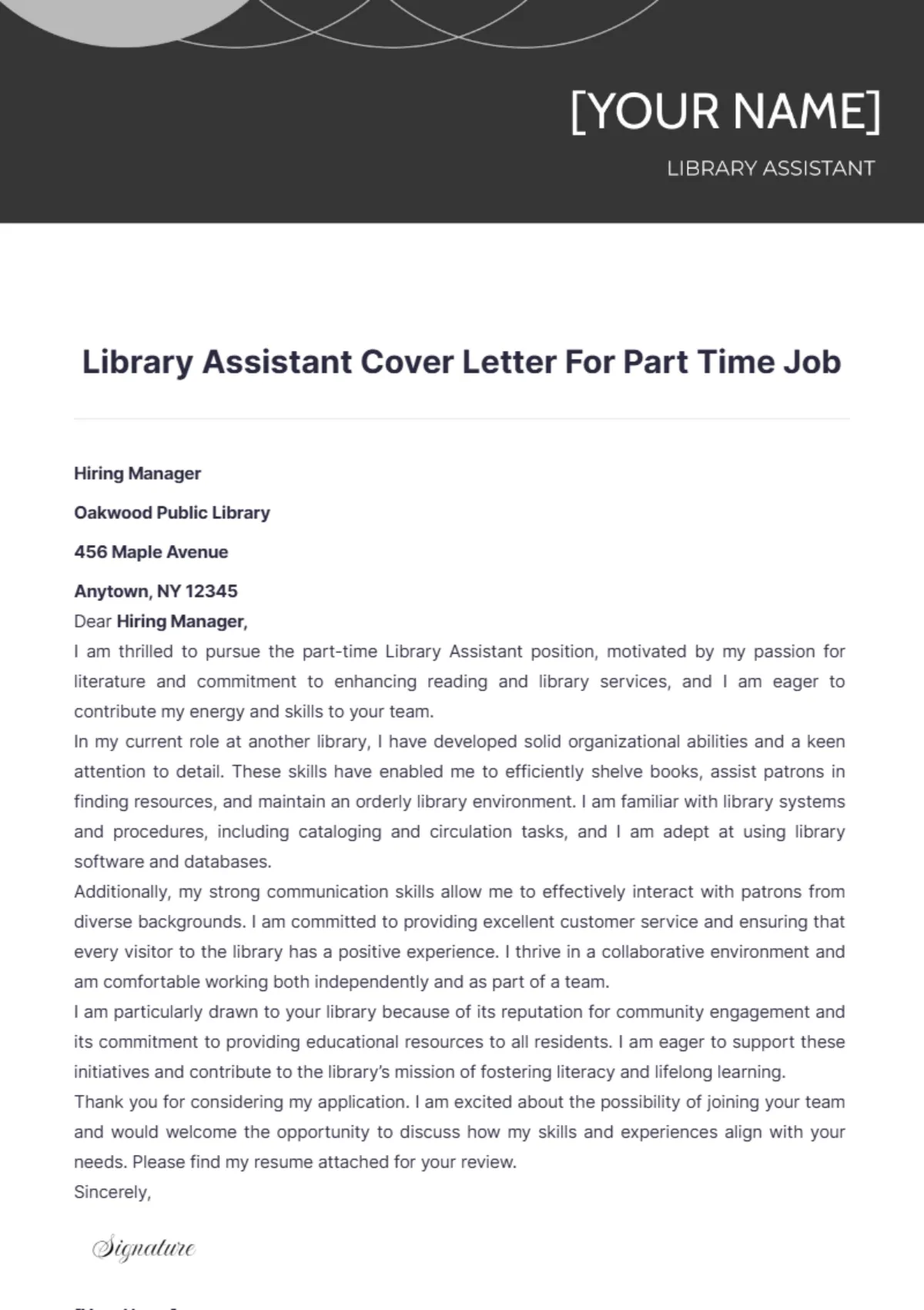
Avoid these common mistakes to make your cover letter stand out positively. Do not make generic statements. Instead, use specific examples and tailor your letter to the library and the job. Avoid clichés and buzzwords. Be genuine and use your own voice. Don’t include irrelevant information that doesn’t relate to the job. Keep your focus on the job requirements and how you meet them. Ensure you do not exceed the desired length, which is typically one page. Proofread carefully for errors. Avoid negativity or expressing frustrations. Focus on your strengths and what you can offer. Ensure you don’t neglect to follow the application instructions, and always tailor your letter to the specific job. By avoiding these common pitfalls, you can create a cover letter that is professional and effective.
Cover Letter Template for Library Jobs
While every cover letter should be personalized, a template can provide a helpful starting point. A standard template should include your contact information, the date, the hiring manager’s name and the library’s address, an opening paragraph stating the position and your interest, body paragraphs highlighting relevant skills and experience, and a closing paragraph reiterating your interest and thanking the reader. Remember to customize the template for each job application. Research the library and tailor the content to their needs. Use your own skills and experiences as examples. Keep the tone and style professional. Revise and proofread to ensure your letter is customized. Using a template provides a framework for a well-structured, personalized cover letter that stands out. This approach helps you create a compelling document that showcases your qualifications.
